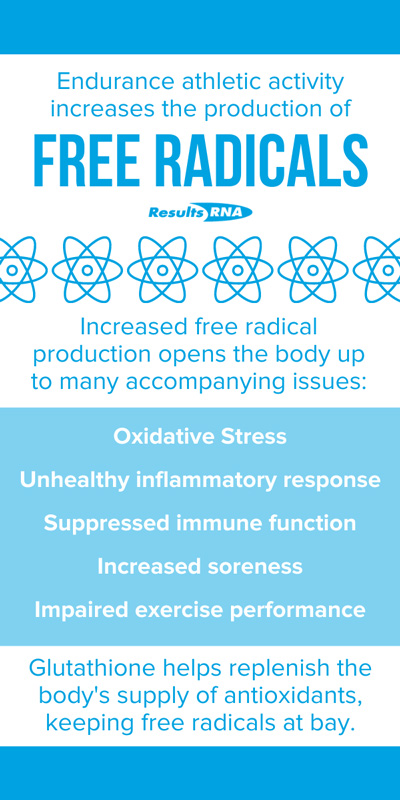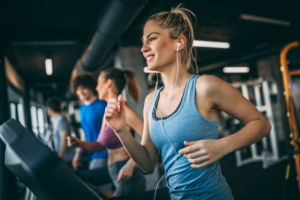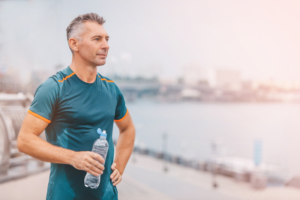Using Glutathione for Exercise and Recovery? Antioxidant Depletion in Athletes
Let’s explore the effects of exercise on the body and learn why glutathione is key to promoting greater sports performance and exercise recovery.
The benefits of regular physical exercise and sports performance are well established. However, physical exercise also results in the generation of reactive oxygen species (ROS) in exercising muscle, which is why it is important to replenish your body with antioxidants such as glutathione. Made more effective than ever with our patented Advanced Cellular technology, ACG Glutathione gets the job done.
Why Endurance Athletes Need to Keep Glutathione Levels High
Endurance athletes spend many hours participating in intense and prolonged training each week. This caliber of high impact workout requires the extremely efficient use of oxygen in skeletal muscle and often creates an oxidative dilemma that may increase free radical production.

This extra free radical production opens the body up for accompanying issues, including but not limited to:
- Oxidative Stress
- Unhealthy inflammatory response
- Suppressed immune function
- Increased soreness
- Impaired exercise performance
To counteract free radical damage, the body’s antioxidant defenses generally take over to protect host tissues. If antioxidant resources become depleted, inflammation and immune suppression can occur before the athlete’s tissues have time to recover from the exercise or training event.
Adequate glutathione (GSH), the body’s master antioxidant, is essential for the immune system’s lymphocytes to function properly. Oxidative stress and free radical accumulation may lead to sustained immunocyte challenge and result in depletion of intracellular glutathione.
GSH is also essential to aerobic muscular contraction, so competition between the immune and muscular systems for GSH precursors may subsequently develop.
This competition for glutathione may potentially result in one of two scenarios:
- Skeletal muscle may become deprived of enough glutathione to sustain a normal aerobic metabolism during intense or endurance exercise
- Glutathione depletion may result in a brief immune suppression following the period of intense exercise.
Suppression of cellular immunity has been observed within 30 min after exhaustive exercise and can last for 24-28 hours, demonstrating the connection between exercise-induced oxidative stress, glutathione depletion, and the immune response. A reduction in mitochondrial function has also been demonstrated after intense periods of exercise.
What Will Glutathione Do For Me While Exercising?
Supplemental glutathione, the “master antioxidant”, has been shown to markedly improve physical exercise endurance, and to play a critical role in the circumvention of exercise-induced oxidative stress. Increasing tissue and blood glutathione are likely to be important in controlling exercise-induced oxidative stress and perhaps in enhancing physical performance.
Are Glutathione Supplements Safe to Take While Exercising, and Does Glutathione Help in Workout Recovery?
Whether you are an elite athlete looking for sports performance supplements, or an around-the-block jogger wanting a natural way to support your stamina, a glutathione supplement can be taken to promote healthy endurance levels for your workout.
Glutathione is a naturally occurring substance, unlike your typical pre-workouts that often contain large amounts of caffeine and sugar. These and other unnatural substances can cause an increase in blood flow and heart rate, which may result in dangerous side effects.
Glutathione supplementation can be an effective way to enhance your sports performance naturally and safely, while also helping your body to recover between exercise.
What to be Aware of When Looking for a Glutathione Supplement

Glutathione is an important antioxidant naturally produced in our bodies that aids in preventing damage to important cellular components caused by reactive oxygen species (ROS). Unfortunately, levels of endogenously produced glutathione begin to decline by our 30s; therefore supplementations with glutathione may be necessary to help ward off oxidative stress as our natural levels decline.
Historically, there has been a lot of speculation indicating that glutathione supplements are not well absorbed when taken orally and therefore not systemically bioavailable. This is true of some pills and capsules, but there is another way to take glutathione.
The most well-absorbed form of oral glutathione currently available as a dietary supplement is ACG Glutathione by Results RNA, an Advanced Cellular Intra-oral spray featuring glutathione and important precursors. Recent studies have demonstrated that S-Acetyl-Glutathione (found in ACG Glutathione) increases intracellular glutathione levels more effectively than non-acetylated glutathione. As previously established, the body cannot perform its best without high glutathione levels. As an athlete glutathione becomes crucial to performing well. ACG Glutathione keeps your body working optimally, getting you to the next level in a natural, safe, and healthy manner.
Glutathione for Exercise and Post-workout Recovery
Whether you are a professional athlete, a health connoisseur, or just trying to make it to the gym a couple times a week, glutathione is vital for optimal health. Free radical production is inevitable, and the havoc these agents wreak effects more than just post-workout muscle recovery. In order to keep your immune system running, your cells functioning properly, and your muscles recovering well, you must have sufficient glutathione levels.
Advanced Cellular Glutathione Intra-oral spray is a highly effective form of oral glutathione. This formula is convenient. It is portable enough to take on any trip and fits into any gym bag. Simply spray and be on your way.
References:
1. Wolbarsht, M. L. and Firdovich, I. (1989). Hyperoxia during reperfusion is a factor in reperfusion injury. Free Rad. Biol. Med., 6, 61±62.
2. Davies KJ, Quintanilha AT, Brooks GA, Packer L. Free radicals and tissue damage produced by exercise. Biochem Biophys Res Commun. 1982 Aug 31;107(4):1198-205.
3. Hassan ES. Muscle damage and immune responses to prolonged exercise in environmental extreme conditions. J Sports Med Phys Fitness 2016;56:1206-1213.
4. Balakrishnan SD, Anuradha CV. Exercise, depletion of antioxidants and antioxidant manipulation. Cell Biochem Funct 1998;16:269-275.
5. Cazzulani P, Cassin M, Ceserani R. Increased endurance to physical exercise in mice given oral reduced glutathione (GSH). Med Sci Res 1991;19:543-544.
6. Novelli GP, Bracciotti G, Falsini S. Spin trappers and vitamin E prolong endurance to muscle fatigue in mice. Free Rad Biol Med 1995;8:9-13.
7. Sen CK, Atalay M, Hanninen O. Exercise-induced oxidative stress, glutathione supplementation and deficiency. J Appl. Physiol 1994;77:2177-2187.
8. Palazzetti S, Rousseau AS, Richard MJ, et al. Antioxidant supplementation preserves antioxidant response in physical training and low antioxidant intake. Br J Nutr 2004;91:91-100.
9. Slattery, KM, Dascombe, B, et al. Effect of N-acetylcysteine on cycling performance after intensified training; Med Sci Sports Exerc 2014;46:1114-1123.
10. Vogel JU, Cinatl J, Dauletbaev N, et al. Effects of S-acetylglutathione in cell and animal model of Herpes simplex virus type 1 infection. Med Microbiol Immunol 2005;194:55-59.
11. https://www.livescience.com/53095-do-preworkout-supplements-work.html





